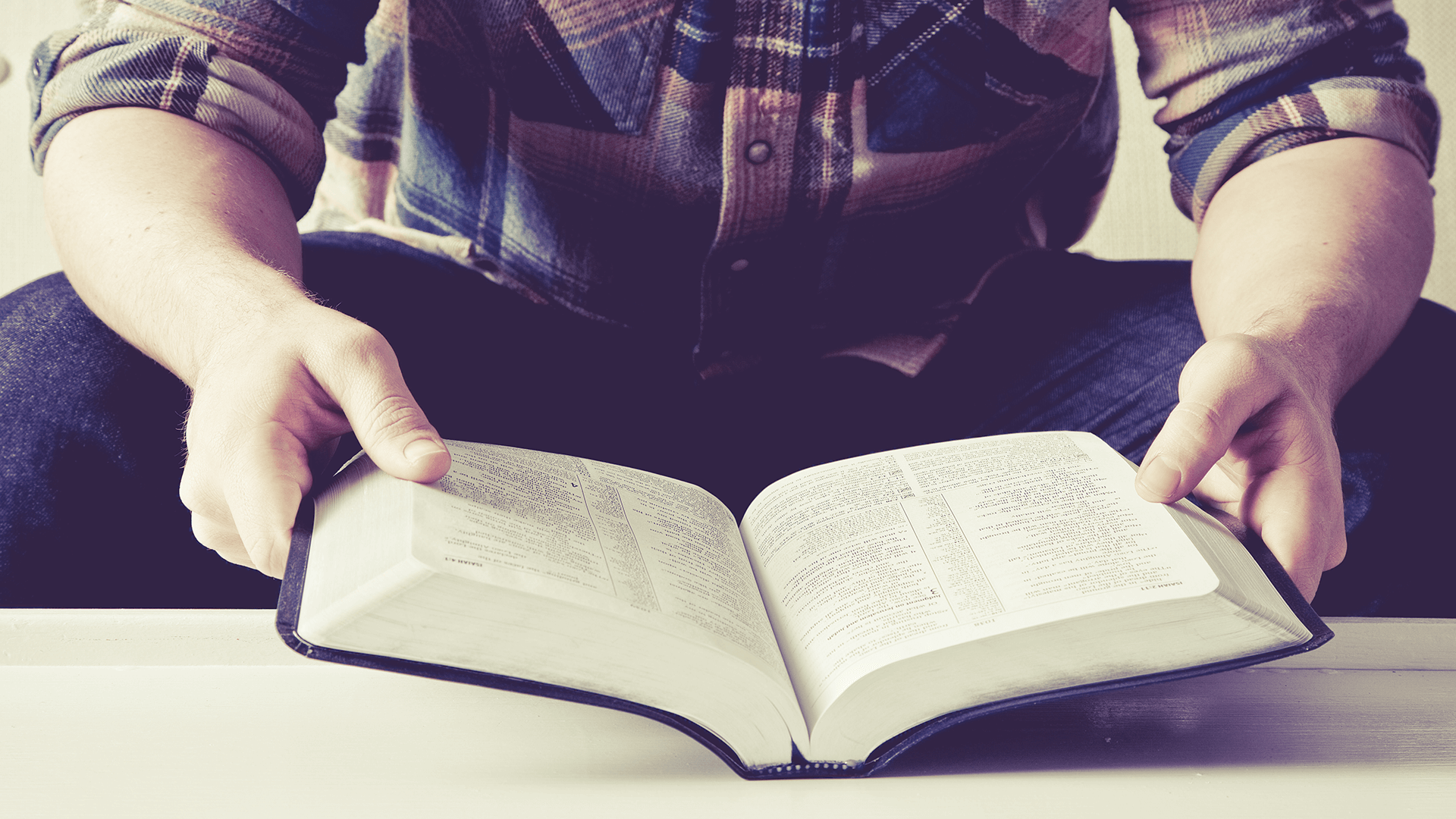June 30th, 2022
June 30, 2022

Today's Reading:
New Testament & Psalms Plan: Acts 5:17–42, Psalm 78:23–28
Entire Bible Plan: Acts 5:17–42, Psalm 78:23–28, 2 Kings 23:28–25:30
Download NT & Psalms Plan Download Entire Bible Plan
In and out of Prison
Then the high priest rose up. He and all who were with him, who belonged to the party of the Sadducees, were filled with jealousy. So they arrested the apostles and put them in the public jail. But an angel of the Lord opened the doors of the jail during the night, brought them out, and said, "Go and stand in the temple, and tell the people all about this life." Hearing this, they entered the temple at daybreak and began to teach.
The Apostles on Trial Again
When the high priest and those who were with him arrived, they convened the Sanhedrin—the full council of the Israelites—and sent orders to the jail to have them brought. But when the servants got there, they did not find them in the jail; so they returned and reported, "We found the jail securely locked, with the guards standing in front of the doors, but when we opened them, we found no one inside." As the captain of the temple police and the chief priests heard these things, they were baffled about them, wondering what would come of this.
Someone came and reported to them, "Look! The men you put in jail are standing in the temple and teaching the people." Then the commander went with the servants and brought them in without force, because they were afraid the people might stone them. After they brought them in, they had them stand before the Sanhedrin, and the high priest asked, "Didn't we strictly order you not to teach in this name? Look, you have filled Jerusalem with your teaching and are determined to make us guilty of this man's blood."
Peter and the apostles replied, "We must obey God rather than people. The God of our ancestors raised up Jesus, whom you had murdered by hanging him on a tree. God exalted this man to his right hand as ruler and Savior, to give repentance to Israel and forgiveness of sins. We are witnesses of these things, and so is the Holy Spirit whom God has given to those who obey him."
Gamaliel's Advice
When they heard this, they were enraged and wanted to kill them. But a Pharisee named Gamaliel, a teacher of the law who was respected by all the people, stood up in the Sanhedrin and ordered the men to be taken outside for a little while. He said to them, "Men of Israel, be careful about what you're about to do to these men. Some time ago Theudas rose up, claiming to be somebody, and a group of about four hundred men rallied to him. He was killed, and all his followers were dispersed and came to nothing. After this man, Judas the Galilean rose up in the days of the census and attracted a following. He also perished, and all his followers were scattered.
So in the present case, I tell you, stay away from these men and leave them alone. For if this plan or this work is of human origin, it will fail; but if it is of God, you will not be able to overthrow them. You may even be found fighting against God.” They were persuaded by him. After they called in the apostles and had them flogged, they ordered them not to speak in the name of Jesus and released them. Then they went out from the presence of the Sanhedrin, rejoicing that they were counted worthy to be treated shamefully on behalf of the Name. Every day in the temple, and in various homes, they continued teaching and proclaiming the good news that Jesus is the Messiah.
Acts 5:38-42
Scripture quotations have been taken from the Christian Standard Bible®, Copyright © 2017 by Holman Bible Publishers. Used by permission. Christian Standard Bible® and CSB® are federally registered trademarks of Holman Bible Publishers.
and opened the doors of heaven.
He rained manna for them to eat;
he gave them grain from heaven.
People ate the bread of angels.
He sent them an abundant supply of food.
He made the east wind blow in the skies
and drove the south wind by his might.
He rained meat on them like dust,
and winged birds like the sand of the seas.
He made them fall in the camp,
all around the tents.
Scripture quotations have been taken from the Christian Standard Bible®, Copyright © 2017 by Holman Bible Publishers. Used by permission. Christian Standard Bible® and CSB® are federally registered trademarks of Holman Bible Publishers.
Josiah's Death
The rest of the events of Josiah's reign, along with all his accomplishments, are written in the Historical Record of Judah's Kings. During his reign, Pharaoh Neco king of Egypt marched up to help the king of Assyria at the Euphrates River. King Josiah went to confront him, and at Megiddo when Neco saw him he killed him. From Megiddo his servants carried his dead body in a chariot, brought him into Jerusalem, and buried him in his own tomb. Then the common people took Jehoahaz son of Josiah, anointed him, and made him king in place of his father.
Judah's King Jehoahaz
Jehoahaz was twenty-three years old when he became king, and he reigned three months in Jerusalem. His mother's name was Hamutal daughter of Jeremiah; she was from Libnah. He did what was evil in the Lord's sight just as his ancestors had done. Pharaoh Neco imprisoned him at Riblah in the land of Hamath to keep him from reigning in Jerusalem, and he imposed on the land a fine of seventy-five hundred pounds of silver and seventy-five pounds of gold.
Judah's King Jehoiakim
Then Pharaoh Neco made Eliakim son of Josiah king in place of his father Josiah and changed Eliakim's name to Jehoiakim. But Neco took Jehoahaz and went to Egypt, and he died there. So Jehoiakim gave the silver and the gold to Pharaoh, but at Pharaoh's command he taxed the land to give it. He exacted the silver and the gold from the common people, each according to his assessment, to give it to Pharaoh Neco.
Jehoiakim was twenty-five years old when he became king, and he reigned eleven years in Jerusalem. His mother's name was Zebidah daughter of Pedaiah; she was from Rumah. He did what was evil in the Lord's sight just as his ancestors had done.
Jehoiakim's Rebellion and Death
During Jehoiakim's reign, King Nebuchadnezzar of Babylon attacked. Jehoiakim became his vassal for three years, and then he turned and rebelled against him. The Lord sent Chaldean, Aramean, Moabite, and Ammonite raiders against Jehoiakim. He sent them against Judah to destroy it, according to the word of the Lord he had spoken through his servants the prophets. Indeed, this happened to Judah at the Lord's command to remove them from his presence. It was because of the sins of Manasseh, according to all he had done, and also because of all the innocent blood he had shed. He had filled Jerusalem with innocent blood, and the Lord was not willing to forgive.
The rest of the events of Jehoiakim's reign, along with all his accomplishments, are written in the Historical Record of Judah's Kings. Jehoiakim rested with his ancestors, and his son Jehoiachin became king in his place.
Now the king of Egypt did not march out of his land again, for the king of Babylon took everything that had belonged to the king of Egypt, from the Brook of Egypt to the Euphrates River.
Judah's King Jehoiachin
Jehoiachin was eighteen years old when he became king, and he reigned three months in Jerusalem. His mother's name was Nehushta daughter of Elnathan; she was from Jerusalem. He did what was evil in the Lord's sight just as his father had done.
Deportations to Babylon
At that time the servants of King Nebuchadnezzar of Babylon marched up to Jerusalem, and the city came under siege. King Nebuchadnezzar of Babylon came to the city while his servants were besieging it. King Jehoiachin of Judah, along with his mother, his servants, his commanders, and his officials, surrendered to the king of Babylon.
So the king of Babylon took him captive in the eighth year of his reign. He also carried off from there all the treasures of the Lord's temple and the treasures of the king's palace, and he cut into pieces all the gold articles that King Solomon of Israel had made for the Lord's sanctuary, just as the Lord had predicted. He deported all Jerusalem and all the commanders and all the best soldiers—ten thousand captives including all the craftsmen and metalsmiths. Except for the poorest people of the land, no one remained.
Nebuchadnezzar deported Jehoiachin to Babylon. He took the king's mother, the king's wives, his officials, and the leading men of the land into exile from Jerusalem to Babylon. The king of Babylon brought captive into Babylon all seven thousand of the best soldiers and one thousand craftsmen and metalsmiths—all strong and fit for war. And the king of Babylon made Mattaniah, Jehoiachin's uncle, king in his place and changed his name to Zedekiah.
Judah's King Zedekiah
Zedekiah was twenty-one years old when he became king, and he reigned eleven years in Jerusalem. His mother's name was Hamutal daughter of Jeremiah; she was from Libnah. Zedekiah did what was evil in the Lord's sight just as Jehoiakim had done. Because of the Lord's anger, it came to the point in Jerusalem and Judah that he finally banished them from his presence. Then Zedekiah rebelled against the king of Babylon.
Nebuchadnezzar's Siege of Jerusalem
In the ninth year of Zedekiah's reign, on the tenth day of the tenth month, King Nebuchadnezzar of Babylon advanced against Jerusalem with his entire army. They laid siege to the city and built a siege wall against it all around. The city was under siege until King Zedekiah's eleventh year.
By the ninth day of the fourth month the famine was so severe in the city that the common people had no food. Then the city was broken into, and all the warriors fled at night by way of the city gate between the two walls near the king's garden, even though the Chaldeans surrounded the city. As the king made his way along the route to the Arabah, the Chaldean army pursued him and overtook him in the plains of Jericho. Zedekiah's entire army left him and scattered. The Chaldeans seized the king and brought him up to the king of Babylon at Riblah, and they passed sentence on him. They slaughtered Zedekiah's sons before his eyes. Finally, the king of Babylon blinded Zedekiah, bound him in bronze chains, and took him to Babylon.
Jerusalem Destroyed
On the seventh day of the fifth month—which was the nineteenth year of King Nebuchadnezzar of Babylon—Nebuzaradan, the captain of the guards, a servant of the king of Babylon, entered Jerusalem. He burned the Lord's temple, the king's palace, and all the houses of Jerusalem; he burned down all the great houses. The whole Chaldean army with the captain of the guards tore down the walls surrounding Jerusalem. Nebuzaradan, the captain of the guards, deported the rest of the people who remained in the city, the deserters who had defected to the king of Babylon, and the rest of the population. But the captain of the guards left some of the poorest of the land to be vinedressers and farmers.
Now the Chaldeans broke into pieces the bronze pillars of the Lord's temple, the water carts, and the bronze basin, which were in the Lord's temple, and carried the bronze to Babylon. They also took the pots, shovels, wick trimmers, dishes, and all the bronze articles used in the priests' service. The captain of the guards took away the firepans and sprinkling basins—whatever was gold or silver.
As for the two pillars, the one basin, and the water carts that Solomon had made for the Lord's temple, the weight of the bronze of all these articles was beyond measure. One pillar was twenty-seven feet tall and had a bronze capital on top of it. The capital, encircled by a grating and pomegranates of bronze, stood five feet high. The second pillar was the same, with its own grating.
The captain of the guards also took away Seraiah the chief priest, Zephaniah the priest of the second rank, and the three doorkeepers. From the city he took a court official who had been appointed over the warriors; five trusted royal aides found in the city; the secretary of the commander of the army, who enlisted the people of the land for military duty; and sixty men from the common people who were found within the city. Nebuzaradan, the captain of the guards, took them and brought them to the king of Babylon at Riblah. The king of Babylon put them to death at Riblah in the land of Hamath. So Judah went into exile from its land.
Gedaliah Made Governor
King Nebuchadnezzar of Babylon appointed Gedaliah son of Ahikam, son of Shaphan, over the rest of the people he left in the land of Judah. When all the commanders of the armies—they and their men—heard that the king of Babylon had appointed Gedaliah, they came to Gedaliah at Mizpah. The commanders included Ishmael son of Nethaniah, Johanan son of Kareah, Seraiah son of Tanhumeth the Netophathite, and Jaazaniah son of the Maacathite—they and their men. Gedaliah swore an oath to them and their men, assuring them, "Don't be afraid of the servants of the Chaldeans. Live in the land and serve the king of Babylon, and it will go well for you."
In the seventh month, however, Ishmael son of Nethaniah, son of Elishama, of the royal family, came with ten men and struck down Gedaliah, and he died. Also, they killed the Judeans and the Chaldeans who were with him at Mizpah. Then all the people, from the youngest to the oldest, and the commanders of the army, left and went to Egypt, for they were afraid of the Chaldeans.
Jehoiachin Pardoned
On the twenty-seventh day of the twelfth month of the thirty-seventh year of the exile of Judah's King Jehoiachin, in the year Evil-merodach became king of Babylon, he pardoned King Jehoiachin of Judah and released him from prison. He spoke kindly to him and set his throne over the thrones of the kings who were with him in Babylon. So Jehoiachin changed his prison clothes, and he dined regularly in the presence of the king of Babylon for the rest of his life. As for his allowance, a regular allowance was given to him by the king, a portion for each day, for the rest of his life.




Login To Leave Comment